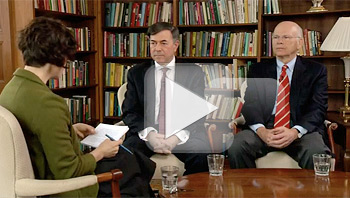Two trustee leaders talk finances, faculty and 'polishing the jewel'
On March 11 the Cornell Board of Trustees elected a new chairman: Robert S. Harrison, a 1976 graduate and chief executive officer of the Clinton Global Initiative. He is a former student trustee, a Rhodes scholar, a lawyer and a retired managing director of The Goldman Sachs Group. He chairs the board's executive committee and has been a trustee since 2002.

Robert S. Harrison '76, CEO of the Clinton Global Initiative, left, becomes the new chairman of the board of trustees in 2012. Here, he and current chairman Peter C. Meinig '61 share thoughts about the state of the university during a video interview.
Harrison's two-and-a-half-year term begins in 2012. He will succeed Peter C. Meinig '61, who has chaired the board since 2002.
Here, Harrison and Meinig share some thoughts about the state of the university.
Mr. Harrison, when you served as a student trustee 1975-76, did you imagine that you would serve again -- and chair the board?
Absolutely not, on chairing of the board. That is a complete surprise. But I actually had hoped after graduating, given what an extraordinary experience it was being a student trustee, that I might be fortunate enough to serve again on the board at some point.
Back then, it was a much more partisan situation, where student trustees looked at themselves as representing students as opposed to representing the interests of the university as a whole. The board essentially tolerated student trustees back then, whereas under Pete's leadership, the board values students' input. We really do look forward to hearing from our student trustees as a very important constituency.
Cornell has established a $100 million Faculty Renewal Fund to hire up to 1,000 new faculty members over the next decade. How will we raise the money? How will we compete against peer institutions for replacements?
Meinig: Half of the fund will be raised from the reallocation of internal resources by the president and provost, and $50 million will be raised through philanthropy. All universities are under financial stress today, some more than others, and we have made a commitment that we are going to be very aggressive in faculty hiring. Many universities will not be able to do this. This creates a good marketplace for us.
Can Cornell afford to continue and increase the amount of financial aid that will be necessary to bring deserving students to Cornell?
Harrison: Financial aid is part of the DNA of Cornell. I can't imagine the board decreasing its commitment. It's a question of priorities and how you allocate or reallocate resources. Given what's happened in the economy, given 9 percent unemployment, the families of many of our students are very seriously affected. So this isn't the time to reallocate downward.
Is Cornell doing enough to ensure the academic success of underrepresented minority students?
Harrison: These initiatives in many cases go back to the 1960s. What the university is doing by evaluating and reevaluating is exactly what needs to be done on a constant basis. … It's an ongoing effort that the university is very committed to doing and must do.
Meinig: Are we doing enough? The answer is no. You can never do enough. There is certainly a focus from the board, at the administration level, also, on the issue, and I think that focus is going to continue.
Mr. Meinig, what advice will you give Mr. Harrison?
Meinig: I would say to him, you are holding a jewel in your hands. What the board needs to do under Bob's leadership is polish that jewel. You don't want to cut the jewel and change all the facets of the jewel. The role of the board is one of advice and consent, choosing outstanding administrative leadership at the university and then supporting that leadership.
What are the university's greatest challenges and opportunities through its sesquicentennial in 2015?
Meinig: Our challenges are in part financial, in part related to the human resources at the university. We definitely will expect reduced support from the state, and we have to deal with that in an appropriate way. We have to deal with the issue of faculty renewal and that certainly is a major challenge.
I think we also have to look at the student experience here at Cornell. We've seen some of these issues come to the forefront over the last year or so. These are issues that are nationwide issues. Cornell, because of our diversity, because of the makeup of our student body, has a unique opportunity to be a leader to finding and implementing the appropriate solutions to these challenges. I'm very optimistic about the future of Cornell and the future of higher education in the country.
Harrison: First and foremost is faculty renewal. That's going to set the tone for decades to come. Second, sustaining a "caring community" and investing in the mental and physical health of our student body and others in the Cornell community is critically important.
Finally, I would say that taking a hint from President [David] Skorton and his desire to focus on public engagement in a global sense -- in other words, making Cornell the land-grant university to the world -- is a challenge and a huge opportunity.